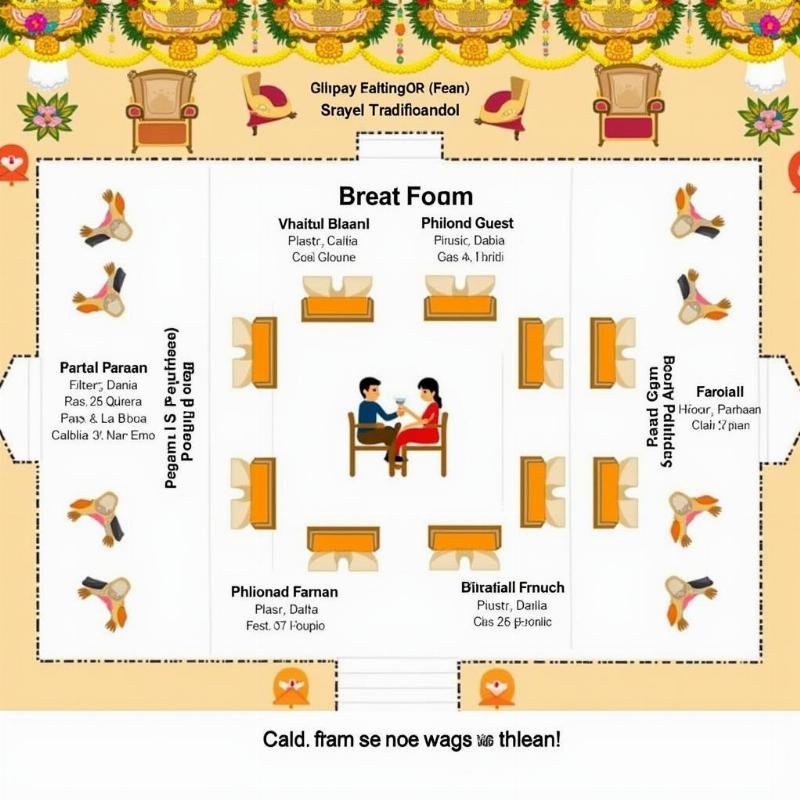The phrase “your place” in Hindi translates most commonly to “aapka sthaan” (आपका स्थान). Understanding its nuances is key to navigating social and cultural contexts in India. While a direct translation might suffice in some situations, “aapka sthaan” carries deeper implications related to respect, hierarchy, and belonging. This article delves into the various meanings and usages of “your place” in Hindi, offering practical insights for travelers and language enthusiasts alike.
Decoding “Aapka Sthaan”: Beyond the Literal Translation
While “aapka sthaan” literally means “your place,” it’s often used to convey more than just a physical location. It can refer to one’s position in society, family, or even a specific event. For example, “aapka sthaan yahan hai” (आपका स्थान यहाँ है) might be said to indicate where someone should sit at a ceremony, reflecting their status or role. This understanding goes beyond simply pointing to a chair; it acknowledges the individual’s importance within the given context.
What does “your place” mean in Hindi when referring to social standing? In hierarchical societies like India, understanding one’s “sthaan” is crucial for navigating social interactions. It influences how people address each other, the level of formality used, and even the gestures employed.
Different Contexts, Different Meanings: Exploring Usage
“Your place” in Hindi can also be expressed using other phrases depending on the context. “Tumhara ghar” (तुम्हारा घर) simply means “your house” and is a more informal way to ask about someone’s residence. “Aap ka pata” (आप का पता) translates to “your address” and is used for formal inquiries about location. Knowing these variations is crucial for effective communication.
“Your Place” in Formal Settings
In formal situations, using “aapka sthaan” emphasizes respect and deference. Imagine attending a wedding in India. You might be told, “Aapka sthaan stage ke paas hai” (आपका स्थान स्टेज के पास है), indicating a designated seat near the stage, perhaps reserved for close family or honored guests.
“Your Place” in Informal Conversations
Among friends and family, less formal terms like “tumhara ghar” are common. You could ask a friend, “Tumhara ghar kahan hai?” (तुम्हारा घर कहाँ है?) meaning “Where is your house?” without any implication of hierarchy or status.
Cultural Nuances and Etiquette: Respecting “Sthaan”
Understanding the concept of “sthaan” is vital for respecting Indian culture. It reflects the emphasis on hierarchy and social order. Observing these nuances will help you build stronger relationships and avoid unintentional misunderstandings.
 Seating arrangement at a traditional Indian wedding
Seating arrangement at a traditional Indian wedding
For instance, offering your seat to an elder demonstrates respect for their “sthaan” in the family or community. Similarly, addressing people with appropriate honorifics acknowledges their position and shows courtesy.
Conclusion: Navigating the Nuances of “Your Place”
From formal addresses to casual conversations, understanding the different ways to express “your place” in Hindi is crucial for effective communication. Whether you’re asking for directions or attending a social gathering, remembering these nuances will enhance your interactions and show respect for Indian culture. So, next time you’re in India, remember the significance of “aapka sthaan” – it’s more than just a place; it’s a reflection of respect, belonging, and cultural understanding.
FAQ
- What is the most common way to say “your place” in Hindi? The most common way is “aapka sthaan” (आपका स्थान).
- Is “aapka sthaan” always formal? While generally respectful, it can be used in less formal contexts when referring to a designated spot or position.
- How do I ask for someone’s address in Hindi? Formally, you can say “Aap ka pata” (आप का पता). Informally, you can say “Tumhara ghar kahan hai?” (तुम्हारा घर कहाँ है?).
- Why is understanding “sthaan” important in Indian culture? It reflects the emphasis on hierarchy and social order, contributing to respectful interactions.
- What are some other ways to show respect in Indian culture? Offering your seat to elders, using appropriate honorifics, and showing deference to authority figures are all ways to demonstrate respect.
PlaTovi, your trusted travel partner, specializes in creating unforgettable travel experiences in India and beyond. From customized tours to hotel bookings and flight arrangements, we cater to all your travel needs. Contact us today to plan your dream vacation! Email: [email protected], Phone: +91 22-2517-3581. Let PlaTovi help you discover your next adventure!